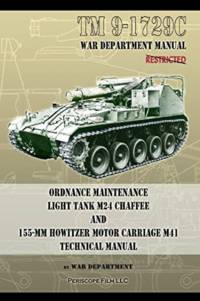Om TM9-1729C Ordnance Maintenance Light Tank M24 Chaffee
The Light Tank M24 was an American tank used during the later part of World
War II and in postwar conflicts including the Korean War and, with the French,
in the War in Algeria and the First Indochina War. In British service it was given
the service name Chaffee, after the United States Army General Adna R.
Chaffee, Jr., who helped develop the use of tanks in the United States armed
forces.
In April 1943, the Ordnance Corps, together with Cadillac division of General
Motors, started work on the new project, designated Light Tank T24. Every
effort was made to keep the weight of the vehicle under twenty tons. The armor
was kept light, with the glacis plate only twenty five mm thick (but sloped at sixty
degrees from the vertical). A new lightweight 75 mm gun was developed, a
derivative of the gun used in the B-25H Mitchell bomber. The gun had the same
ballistics as the M3, but used a thinly walled barrel and different recoil
mechanism. The design also featured wider (sixteen inch) tracks and torsion bar
suspension. It had a relatively low silhouette and a three-man turret. On
October 15, 1943 the first pilot vehicle was delivered and production began in
1944 under the designation Light Tank M24. By the time production was
stopped in August 1945, 4,731 M24s had left the assembly lines.
The M41 155-mm Howitzer Motor Carriage was based on the M24 Chaffee
Light Tank fitted with an M1 155-mm Howitzer. In addition to the Howitzer, the
M41 carried twenty two rounds of 155-mm ammunition. Also known as the
Gorilla, the M41 eventually saw action in Korea.
Created in 1947, this technical manual reveals a great deal about both the
Chaffee's and M41's design and capabilities. Intended as a manual for those
charged with maintenance, it details many aspects of the Chaffee's track and
suspension, hull, turret and other systems. Originally labeled restricted, this
manual was declassified long ago and is here reprinted in book form. Care has
been taken to preserve the integrity of the text.
Visa mer

